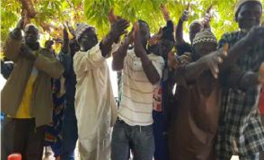
HUSBAND SCHOOLS – Innovative Approaches to support Mothers & Adolescents In Senegal
With funding from Global Affairs Canada, in a consortium of NGOS, led by Plan International, Africare and now PanAfricare implemented the project Strengthening Health Outcomes for Women (SHOW), The project seeks to contribute to the reduction of maternal and infant mortality in the targeted regions among vulnerable and marginalized women, specifically adolescent girls, and their children. This focused on three components: Increasing demand for Maternal, Neonatal and Child Health (MNCH) services, increasing access to MNCH services and the accountability component. To achieve this, one of the strategies focused on establishing husband schools.
All too often in this region, men or husbands are not actively engaged as an important partner in decision making on health issues concerning their spouses and children yet are also decision makers on allocation of resources for instance in relation to health needs. Additionally, a majority of the cultural beliefs, taboos and norms that negatively impact child and maternal health mostly tend to favor or have no impact on men’s health. For instance, when there is food scarcity for a family, males are favored instead of pregnant/lactating mothers who have high nutritional needs. Changing the knowledge and attitudes of men toward health and nutrition practices, is as important as changing the knowledge and attitudes of women. If men are properly provided information on the health and nutritional needs of pregnant, lactating females, children and women in general, and the role they ought to jointly play in ensuring, they
satisfy the health and nutrition needs of their family, men will more easily change their attitudes and practices toward the health and nutrition needs of pregnant, lactating females, children and women generally.
It is for this reason we target men in our efforts to achieve this goal through husband schools or as referred to in French “Ecole des Maris (EdM)”. This approach was developed by UNFPA and has been adopted in many forms by many organizations. EdMs seek to foster a non-judgmental environment of learning and discussion amongst model husbands in the community with the overall goal of promoting greater involvement of men in Maternal, Neonatal and Child Health MNCH at the individual and community level.
In this project, the EdMs are comprised of 15 voluntary members and one coach chosen by a community forum and supervised by an NGO staff member. EdM activities included focus groups on MNCH issues, home visits to men, community talks followed by film screenings. In implementation of EdM, we identify and gather model husbands of diverse age groups to engage their peers in promoting maternal and neonatal health. It creates a space within the community for information exchange and analysis on the socio-economic situation of the community and the impact it has on their household wellbeing.
During the EdM sessions, project staff seek to : Strengthen the use of reproductive health services such as ANC visits, adhering to treatment regimens, delivery by a skilled birth attendant and accepting family planning services in addition to utilization of other maternal and child health services, promote dialogue in the couple/family, raise awareness of youth sexual and reproductive health issues, increase financing of women’s access to reproductive health services by husband, increase husbands support to allow for increased vitamin A supplementation (VAS) and uptake of other micro-nutrients (iodine, zinc and adoption of Infant and Young Child Feeding (IYCF) best practices.
Highlights from EdMs in two districts (Sedhiou and Bignona)
- 32 men who were enrolled as in EdM led health talk with over 1000 husbands on topics related to maternal health and the importance of husband’s guidance and support for spouse and children access to health care.
- The EdMs were incorporated as OCBs, which allowed them to expand their area of responsibility and serve as a self-support group.
- 80 health talks, 32 focus groups and 26 advocacy sessions were carried out by husbands’ peers
Overall, the EdMs are highly effective at changing men’s attitudes and behavior regarding MNCH. 3 keys outcomes are observed as a result of this activities:
- Members of EdM have more understanding and are more involved in their wives’ health and community health because of what they have learned from the groups.
- Men in villages where there is no EdM appeared less inclined to be involved in the health of their wife.
- Villagers who are not members seem to have a desire to be members and see the groups as a source of knowledge regarding maternal health, and members are often actively attempting to share the teachings with non-members.
This approach supported the project’s objective of increasing demand for health services.
| Highlights fromBeneficiaries : |
| “I did not know that we had to help pregnant women, you know it’s with the club that I dared to enter the hospital. I say it sincerely it’s thanks to the peer club, that’s a great achievement.” Member of the
EdM of Souda, Bignona |
| “So, we thought there are things that only women have to do. But they came to teach us that men also need to get involved in household matters so that the couple’s life is enjoyable, health improves, and things move forward in the community. So, when the woman is cleaning the house, if the child has his natural needs, I must go help clean the child. If the woman is making food in the kitchen, the child has fallen asleep outside, as a man I must be able to carry it and bring it into the room. Before our perception of the role of women and our perception of the role of men in their homes, we need to discuss it.” Member of EdMof Sansamba, Sedhiou
“Before, people knew that they should help their wives, but when the EdMs came it emphasized that. Men start to better understand, through the trainings and awareness building.”Imam and member of the EdM in Sansamba |


